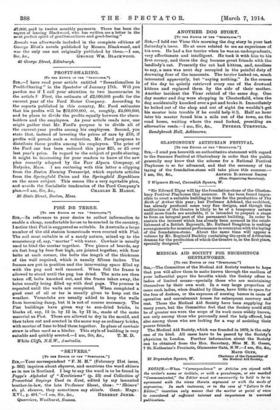PROFIT-SHARING.
(To TM EDITOR o1 THa ..8../TO61 have read your article entitled "Sensationalism in Profit-Sharing" in the Spectator of January 17th. Will you pardon me if I call your attention to two inaccuracies in the article P First, the estimate of £2,000,000 profit for the current year of the Ford Motor Company. According to the reports published in this country, Mr. Ford estimates that his profits will be $20,000,000, or, roughly, £4,000,000, and he plans to divide the profits equally between the share- holders and the employees. As your article reads now, one might gather that Mr. Ford's purpose is to divide all of the current-year profits among his employees. Second, you state that, instead of lowering the prices of cars by £10, if profits will permit such a reduction, Mr. Ford proposes to distribute these profits among his employees. The price of the Ford car has been reduced this year $25, or 25 over last year's price. In regard to the subject of profit-sharing, it might be interesting for your readers to know of the new plan recently adopted by the Farr Alpaca Company, of Holyoke, Mass. I am enclosing with this letter a clipping from the Boston Evening Transcript, which reprints articles from the Springfield Union and the Springfield Republican on the same subject. This seems like a very equitable plan, and avoids the Socialistic tendencies of the Ford Company's pinn.—I am, Sir, &c., CHARLES E. Meson. 30 Slate Street, Boston, Mass.














































 Previous page
Previous page